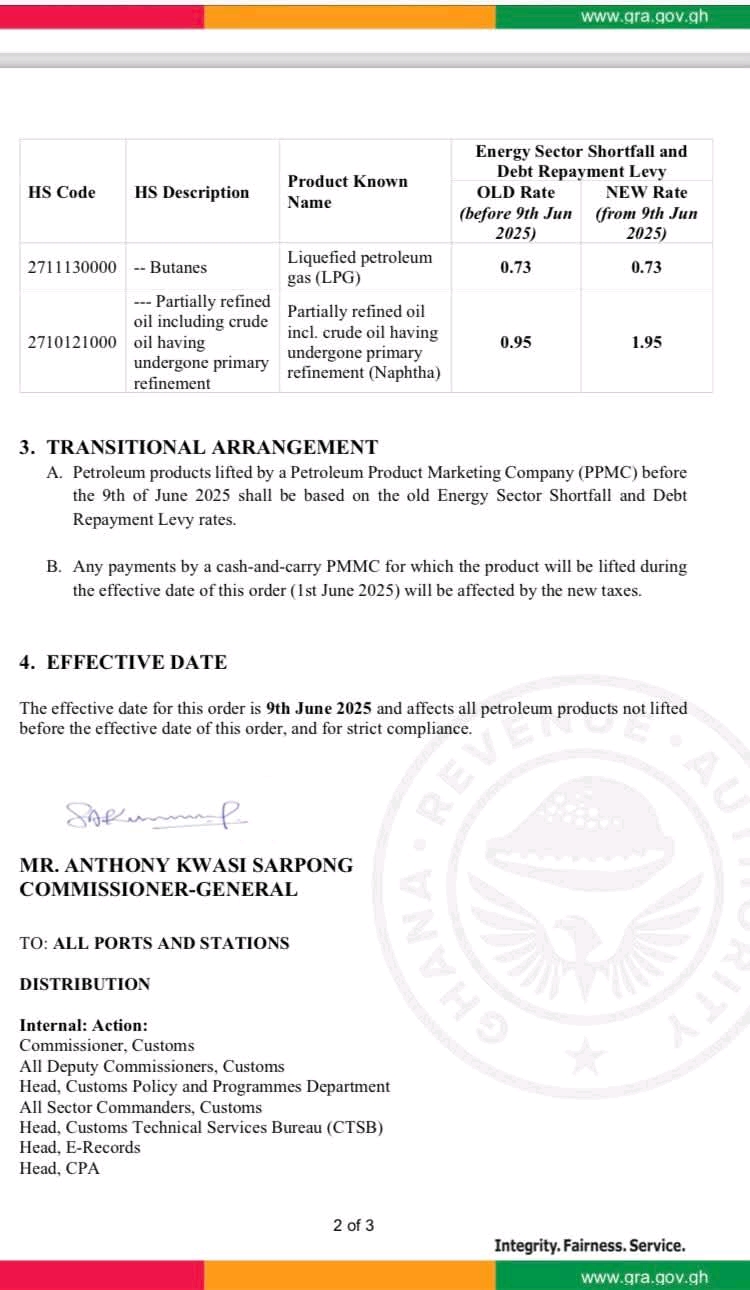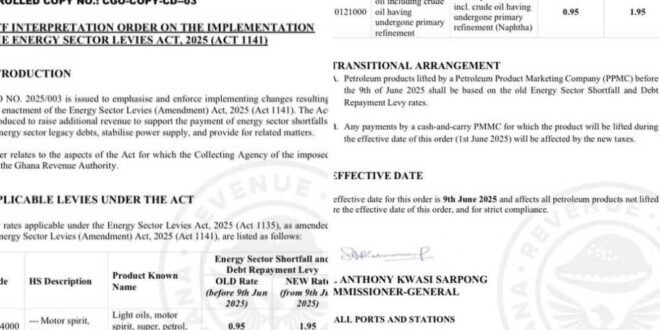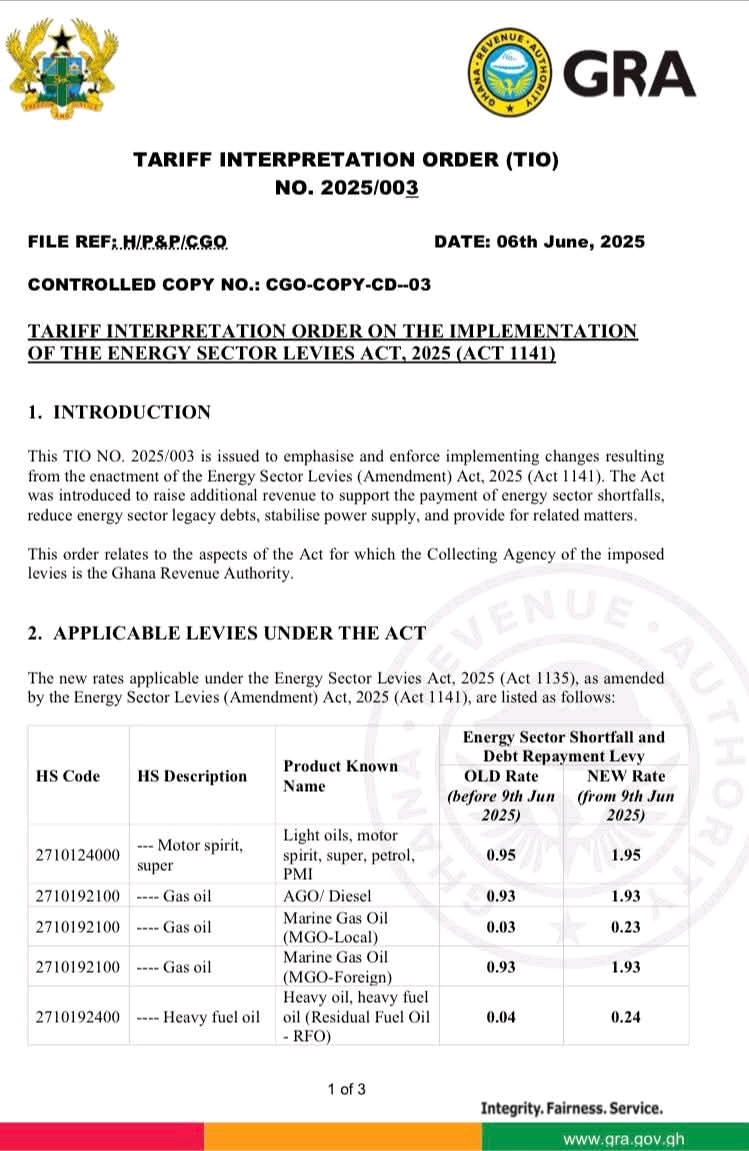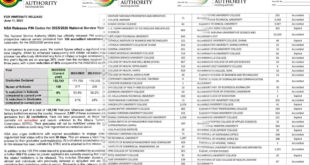Fuel prices in Ghana are set to increase starting June 9, 2025, as the Ghana Revenue Authority (GRA) implements a GH₵1 fuel levy per liter.
This decision comes after Ghana’s Parliament approved the Energy Sector Levy (Amendment) Bill, 2025, which aims to adjust the Energy Sector Shortfall and Debt Repayment Levy on petrol and diesel.
Impact on Consumers
The levy will directly affect consumers, who will bear the brunt of the price increase. With the new levy, fuel prices are expected to rise significantly, impacting not only individual motorists but also businesses that rely heavily on fuel for operations and transportation.
Background
The implementation of the fuel levy is part of the government’s efforts to address energy sector debt and shortfalls.
However, the timing of the price increase may be unfavorable for many Ghanaians, especially the commercial drivers considering the recent reduction of transport fares.
In fact, fuel prices had dropped by up to 9% in the first pricing window of June due to the appreciation of the cedi against the dollar.
Ignoring Public Outcry: Watch How Prez Mahama Assents to Energy Sector ‘Dumsor’ Levy Amendment Bill
GRA’s Implementation
The GRA has confirmed that the implementation of the GH₵1 levy on fuel products will begin on June 9, 2025.
This means that consumers will start paying the increased prices for fuel from Monday, June 9.
The Ghana Revenue Authority (GRA) has announced new levy rates on petroleum products, effective Monday, June 9, 2025, under the revised Energy Sector Levies Act, 2025 (Act 1141).
The announcement was made through Tariff Interpretation Order (TIO) No. 2025/003, which seeks to clarify and enforce the implementation of the Energy Sector Levies (Amendment) Act.
The Act was introduced to raise additional revenue to address energy sector shortfalls, reduce legacy debts, and stabilise the country’s power supply.
The GRA directive outlines significant increases in the Energy Sector Shortfall and Debt Repayment Levy on a range of petroleum products, including petrol, diesel, marine gas oil, and heavy fuel oil.
Under the new directive:
- Motor Spirit (Super Petrol): from Ghc0.95 to Ghc1.95
- AGO/Diesel and Marine Gas Oil (Foreign): from Ghc0.93 to Ghc1.93
- Marine Gas Oil (Local): from Ghc0.03 to Ghc0.23
- Heavy Fuel Oil (Residual Fuel Oil – RFO): from Ghc0.04 to Ghc0.24
- Partially Refined Oil (Naphtha): from Ghc0.95 to Ghc1.95
- Liquefied Petroleum Gas (LPG) remains unchanged at Ghc0.73
The new rates apply to all petroleum products not lifted before June 9, 2025.
However, transitional arrangements have been put in place:
Products lifted by a Petroleum Product Marketing Company (PPMC) before June 9 will still be subject to the old levy rates.
Any “cash-and-carry” transactions by PMMCs, for which products are lifted on or after June 1, 2025, will be subject to the new rates.
Commissioner-General of the GRA, Anthony Kwasi Sarpong, signed the directive and urged all ports and fuel stations to strictly comply.
The Bioland Clearing House Mechanism (CHM) platform is expected to complement the initiative by improving transparency and coordination in national energy and environmental planning.
Meanwhile, Lawyer and Senior Vice President of IMANI-Africa, Kofi Bentil, has slammed the government’s handling of the energy sector, warning that new fuel levies will do little to address the deep-rooted issues of mismanagement and graft.
Speaking on Joy News on Saturday, June 7, Bentil dismissed the rationale behind the recently introduced fuel levy, stating that taxes cannot solve what he described as a “problem of incompetence and corruption” in Ghana’s energy sector.
“The problem in our energy sector will not be solved by taxes. The problem in our energy sector is a problem of incompetence and corruption,” Bentil said, adding “The people who run the energy sector—check—when they leave, they leave very rich.”
Tariff Interpretation Order for the Implementation of the Energy Sector Levies Act, 2025 (Act 1141)

THANK YOU for constantly reading stories on MyGhanaMedia.com, a news publishing website from Ghana. Kindly like, follow, comment, and SHARE stories on all social media platforms for more entertaining updates!
Follow us on Twitter: https://twitter.com/
Source: MyGhanaMedia.com
There are four types of content published on MyGhanaMedia.com daily: curated content; syndicated content; user-generated content; and original content.
 MYGHANAMEDIA.COM Best Source Of Latest News
MYGHANAMEDIA.COM Best Source Of Latest News





